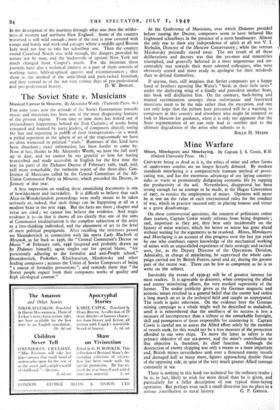The Soviet State v. Musicians
Musical Uproar in Moscow. By Alexander Werth. (Turnstile Press. 6s.) FOR some years now the attitude of the Soviet Government towards music and musicians has been one of the most disquieting features of the present regime. From time to time news has leaked out of 'extraordinary happenings behind the Iron Curtain ; of works being censured and banned by party Jeaders, of composers abjectly toeing the line and repenting in publk of their transgressions—in a word, a pitiful repetition in the sphere of art of the tragi-comedy we have so often witnessed in political " trials." Rumours of this kind have been abundant ; exact information has been harder to come by. Now at last, thanks to Mr. Alexander Werth, we have the full story up to date, and we cannot be too grateful to him for having transcribed and made accessible in English for the first time the text (in part) of the Zhdanov Decree of February loth, 1948, and, Still more remarkable, the verbatim report of the three-days Con- ference of Musicians called by the Central Committee of the All- Union Communist Party in Moscow, which preceded the Decree, in January of that year.
A first impression on reading these astonishing documents is one of bewilderment and incredulity. It is difficult to believe that such Alice-in-Wonderlandish proceedings were really meant to be taken seriously or, indeed, that such things can be happening at all in a modern State in the year 1949. But the facts are there ; chapter and verse are cited ; we cannot but believe the evidence. And tragic evidence it is—in that it shows all too clearly that one of the aims of Communist totalitarianism is the complete subjection of the artist as a free-thinking individual, and the abasement of art to the level of mere political propaganda. After recalling the strictures passed on Shostakovitch in connection with his opera Lady Macbeth of Mtsensk, as far back as 1936, the "Central Committee's Decree on Music " of February loth, 5948 (inspired and probably drawn up
Zhdanov himself), again singles out for special blame, " for persistently adhering to the formalist and anti-People school," Shostakovitch, Prokofiev, Khachaturian, Miaskovsky and other leading composers ; accuses the Union of Soviet Composers of being "a source of formalist perversions "; and reminds them that " the Soviet people expect from their composers works of quality and high ideological content." At the Conference of Musicians, over which Zhdanov presided before issuing the Decree, composers seem to have behaved like frightened schoolboys in the presence of a stern headmaster. Almost the only one to show any independence of spirit at all was V. I. Shebalin, Director of the Moscow Conservatory ; while the veteran Maiskovsky pointedly stayed away. The net result of all these deliberations and decrees was that the yes-men and nonentities triumphed, and generally behaved in a most ungenerous and un- comradely way towards their more talented colleagues, who were obviously scared and more ready to apologise for their misdeeds than to defend themselves.
If anyone, then, still imagines that Soviet composers are a happy band of brothers agreeing like Watts's " birds in their little nests " under the sheltering wing of a kindly and provident mother State, this book will disillusion him. On the contrary, back-biting and mutual recrimination amongst these unfortunate and frustrated musicians seem to be the rule rather than the exception, and one can only hope that the picture here presented will be a warning to composers in this country and elsewhere who might be tempted to look to Moscow for guidance, when it is only too apparent that the State regimentation of art can only lead to sterility and to the ultimate degradation of the artist who submits to it.
Row) H. MYERS






































 Previous page
Previous page